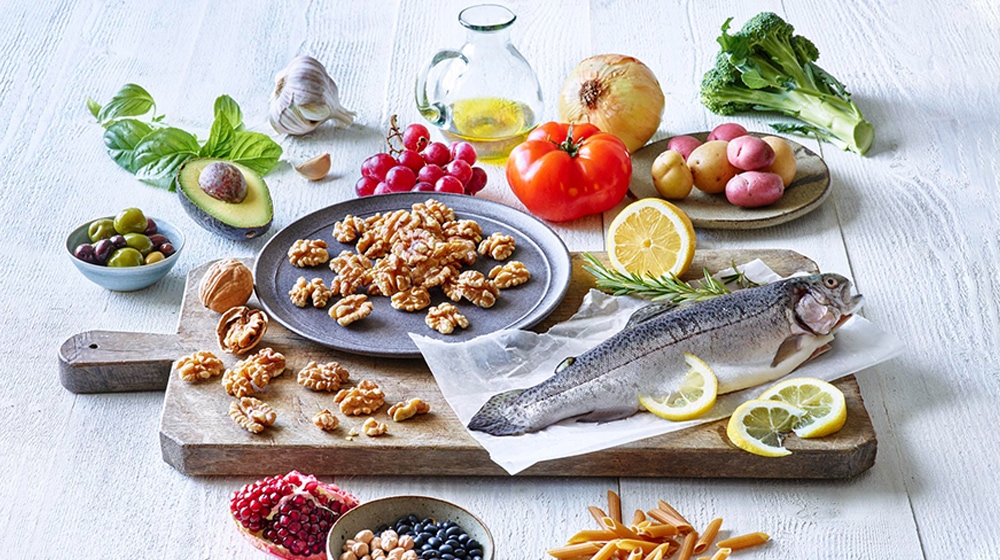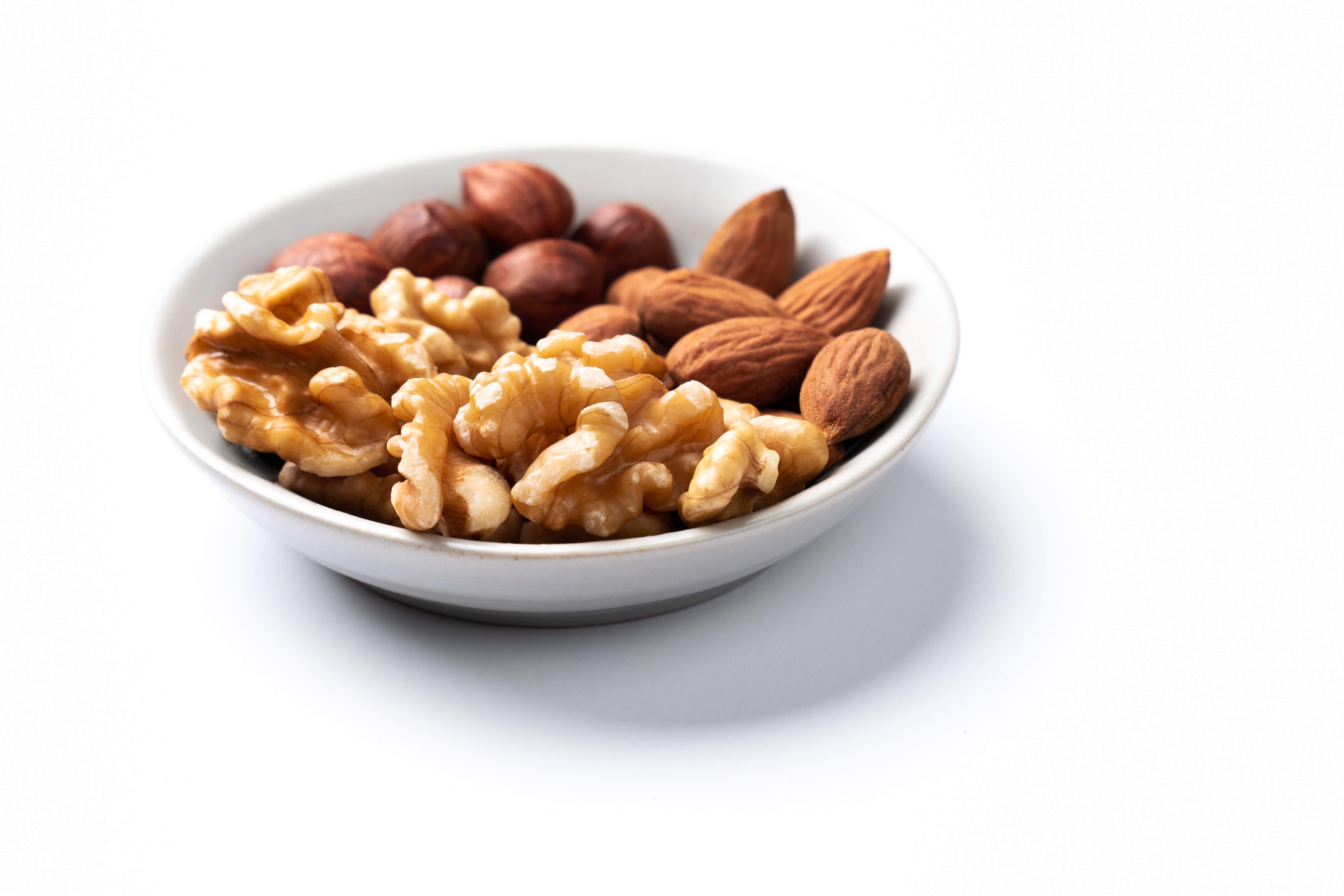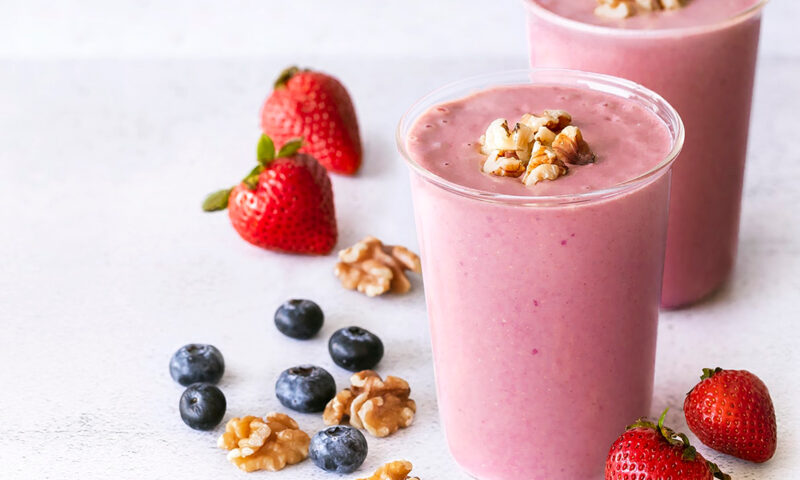With 12% of women and 9% of men in the US experiencing infertility1, or the inability to become pregnant after one year of trying, the interest in the relationship between diet and fertility is on the rise. While there are many factors that may contribute to reproductive health – in both males and females – including age, genetics, hormonal disorders, anatomy of reproductive organs, and certain chronic diseases1, research is ongoing regarding the potential impact diet may have on pregnancy outcomes and the ability to conceive.

Is there a connection between diet patterns and reproductive health?
As a dietitian, I find it’s helpful to recommend an overall dietary pattern. While many studies have focused on individual foods or nutrients when it comes to reproductive health, fewer look at dietary patterns. Some research shows encouraging results for the Mediterranean Diet, which emphasizes high intakes of vegetables, fruit, fish, whole grains, legumes, nuts, and olive oil.2,3 A clinical trial showed pregnant women who followed a Mediterranean-style diet including a daily portion of nuts (50% walnuts, 25% almonds, and 25% hazelnuts), and extra virgin olive oil, had a 35% lower risk for gestational diabetes and on average, gained 2.75 pounds less, compared to women who received standard prenatal care.4 The women in this study were multi-ethnic, inner-city pregnant women with metabolic risk factors, including obesity and chronic hypertension. They received dietary advice to help improve their compliance. However, the investigators ultimately relied on self-reported feedback about what the participants ate and there could have been human error in the reporting.
Another study explored the connection between diet and infertility due to ovulatory disorders. Researchers followed more than 17,500 women over eight years as they tried to become pregnant or became pregnant and analyzed their diet, physical activity, BMI, and various lifestyle factors.5 Following a diet characterized by lower intake of trans fat and saturated fat, greater intake of monounsaturated fat, a lower intake of animal protein with greater vegetable protein intake, a higher intake of high-fiber and low-glycemic carbohydrates, full-fat dairy products over low-fat dairy, higher nonheme iron intake, and higher frequency of multivitamin use was associated with a lower risk of ovulatory disorder infertility. Women that followed this type of diet were more likely to consume coffee and alcohol and be physically active. They were also less likely to be smokers, have long menstrual cycles, and be recent users of hormonal contraception. It’s important to note this study just showed an association and not cause and effect.
While there are minor differences in dietary patterns for males and females, it seems that the best overall dietary pattern to support reproductive health is similar to one for overall health – one that emphasizes plant foods like vegetables and fruit, whole grains, legumes and nuts, as well as seafood, unsaturated fats and dairy while reducing highly refined sugary foods and red or processed meats.
Which specific foods and nutrients are associated with fertility?
Regarding the intake of specific foods or nutrients, some research is inconclusive, while some appears to be stronger.
In females, high intake of folic acid is not only important to prevent neural tube defects once a woman becomes pregnant, it may also increase a woman’s chance of conceiving and carrying a pregnancy to term. It is recommended that women trying to conceive take a daily prenatal multivitamin containing at least 400 micrograms of folic acid, and up to 800 micrograms.6 Folate is important for men, too, as it could play a role in sperm health.7 In addition to supplements, folate can be found in foods, such as dark leafy greens, legumes, walnuts, avocado, and eggs. According to a review paper published in the American Journal of Obstetrics and Gynecology, it was once thought that because soy is a source of phytoestrogens in the diet, it may affect fertility negatively. However, the limited research done in humans has shown no negative impact of soy on reproductive health, and some studies that evaluated soy intake among couples undergoing fertility treatment have shown encouraging results.8 Soy is a good source of plant-based protein, and can be found in minimally processed forms such as edamame, tofu, tempeh, and soy milk.
While there are has been research on the effects of caffeine and alcohol on fertility and pregnancy outcomes, there is established guidance from the USDA. For women who are pregnant or trying to conceive, it is best to consult a health care provider for advice concerning caffeine consumption.9 Some people are more sensitive to the effects of caffeine than others. No safe levels of alcohol during pregnancy have been established, and women who are trying to become pregnant should avoid alcohol.10
Polyunsaturated fatty acids (PUFAs), especially omega-3 fatty acids, have been investigated for their potential role in sperm health as well as incidence of pregnancy.11,12,13,14 Seafood is the main source of the omega-3 fatty acids DHA and EPA. Plant-based foods such as walnuts, flaxseed, and canola oil supply the omega-3 fatty acid ALA. Walnuts are actually the only tree nut that is an excellent source of this essential fatty acid (2.5g/oz). When it comes to seafood, women who are pregnant or breastfeeding should consume at least 8 and up to 12 ounces of a variety of seafood per week, from choices lower in mercury.10 Species higher in mercury include shark, swordfish, King mackerel and tilefish. Choose low mercury species like salmon, shrimp, light tuna, pollock, scallops and sardines.
Walnuts and Reproductive Health
Because the membranes of sperm are made up largely of PUFAs, they are highly susceptible to lipid peroxidation, or oxidative stress that can damage the membranes. Studies have shown PUFAs may play a role in sperm health. In a study on young healthy men, 75 grams of walnuts per day (a source of PUFAs) added to a Western-style diet positively shifted sperm quality (vitality, motility, and shape). The improved semen quality was associated with increases in blood serum omega-6 fatty acids and the plant source of omega-3, ALA, both of which are types of PUFAs.13 In a follow up study done in mice to determine the possible mechanism for sperm improvement when walnuts are included in the diet, it was found it could be due to a decrease in oxidative stress, which can damage sperm. Eating PUFA-rich foods, such as walnuts, may also help replace those fatty acids damaged in the sperm membrane, but more research is still needed.14

In addition, findings from the FERTINUTS randomized controlled trial – the largest clinical trial to date analyzing the effect of nut consumption on erectile and sexual function in healthy men (18-35 years) – found that eating approximately two daily servings (60g) of a nut mixture made up of 50% walnuts, 25% almonds, 25% hazelnuts, as part of a Western-style diet, resulted in a significant increase in orgasmic function and sexual desire. Researchers measured sexual function parameters by having participants complete a validated questionnaire.15
While the results of these studies are encouraging, this research is still emerging, and more is needed to determine the effects walnuts have on men’s reproductive health and how these findings impact the broader male population.
The bottom line when it comes to a fertility-promoting diet? Consume a dietary pattern that is good for overall health – heavy on vegetables, fruit and other plant foods including whole grains, legumes, olive oil and nuts, especially omega-3 ALA containing walnuts. Include fish, dairy, and folate-containing multivitamins for women, and try to limit saturated and trans fats and excess sugar.
Resources
- Reproductive Health: Infertility FAQs. Center for Disease Control and Prevention. https://www.cdc.gov/reproductivehealth/infertility/index.htm
- Karayiannis D, Kontogianni MD, Mendorou C, et al. Adherence to the Mediterranean diet and IVF success rate among non-obese women attempting fertility. Human Reproduction; 2018. 33(3):494–502. https://doi.org/10.1093/humrep/dey003
- Karayiannis D, Kontogianni MD, Mendorou C, et al. Association between adherence to the Mediterranean diet and semen quality parameters in male partners of couples attempting fertility. Hum. Reprod; 2017. 32(1):215–222. https://doi.org/10.1093/humrep/dew288
- H. Al Wattar B, Dodds J, Placzek A, Beresford L, Spyreli E, Moore A, et al. (2019) Mediterranean-style diet in pregnant women with metabolic risk factors (ESTEEM): A pragmatic multicentre randomised trial. PLoS Med; 16(7): e1002857. https://doi.org/10.1371/journal.pmed.1002857
- Chavarro JE, Rich-Edwards JW, Rosner B, et al. Diet and Lifestyle in the Prevention of Ovulatory Disorder Infertility. Obstet Gynecol; 2007. 110(5):1050-1058. doi: 10.1097/01.AOG.0000287293.25465.e1
- NIH U.S. Office of Dietary Supplements. Folate Fact Sheet for Health Professionals. Last updated July 19, 2019. https://ods.od.nih.gov/factsheets/Folate-HealthProfessional/
- Salas-Huetos A, Bulló M, Salas-Salvadó J, Dietary patterns, foods and nutrients in male fertility parameters and fecundability: a systematic review of observational studies, Hum Reprod Update; 2017. 23(4):371–389. https://doi.org/10.1093/humupd/dmx006
- Gaskins AJ, Chavarro JE. Diet and Fertility: A Review. Am J Obstet Gynecol; 2018. 218(4):379-389. https://dx.doi.org/10.1016%2Fj.ajog.2017.08.010
- NIH U.S. National Library of Medicine website. Last updated April 2019. https://medlineplus.gov/caffeine.html
- U.S. Department of Health and Human Services and U.S. Department of Agriculture. 2015 – 2020 Dietary Guidelines for Americans. 8th Edition. December 2015. Available at https://health.gov/dietaryguidelines/2015/guidelines/
- Panth N, Gavarkovs A, Tamez M, et al. The Influence of Diet on Fertility and the Implications for Public Health Nutrition in the United States. Front Public Health; 2018. 6:211. https://dx.doi.org/10.3389%2Ffpubh.2018.00211
- Coletta JM, Bell SJ, Roman AS. Omega-3 Fatty Acids and Pregnancy. Rev Obstet Gynecol; 2010. 3(4):163–171. https://www.ncbi.nlm.nih.gov/pmc/articles/PMC3046737/
- Robbins WA, Xun L, FitzGerald LZ, et al. Walnuts Improve Semen Quality in Men Consuming a Western-Style Diet: Randomized Control Dietary Intervention Trial, Biol Reprod; 2012. 87(4):101, 1–8. https://doi.org/10.1095/biolreprod.112.101634
- Coffua LS, Martin-DeLeon PA. Effectiveness of a walnut-enriched diet on murine sperm: involvement of reduced peroxidative damage. Heliyon; 2017. 3(2). https://doi.org/10.1016/j.heliyon.2017.e00250
- Salas-Huetos A, Muralidharan J, Galiè S, Salas-Salvadó J & Bulló M (2019). “Effect of Nut Consumption on Erectile and Sexual Function in Healthy Males: A Secondary Outcome Analysis of the FERTINUTS Randomized Controlled Trial”. Nutrients; 11(6):1372. https://doi.org/10.3390/nu11061372



